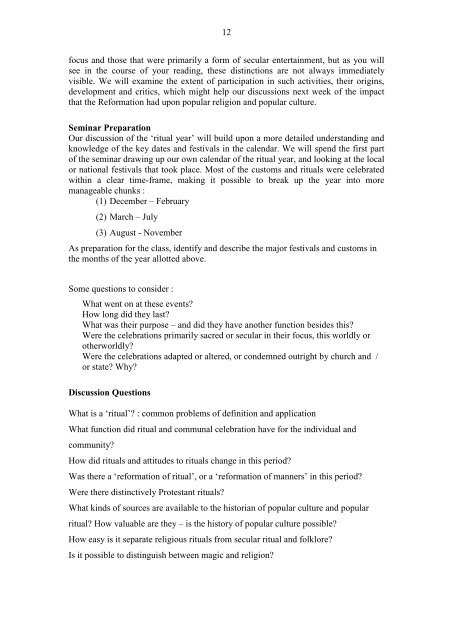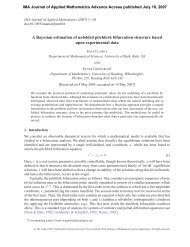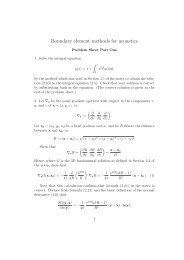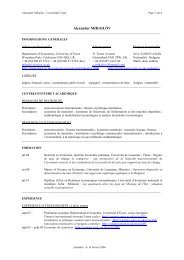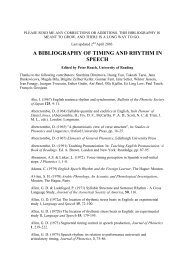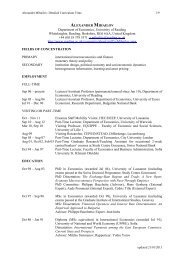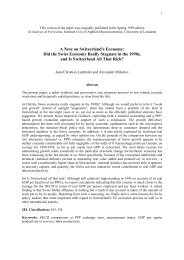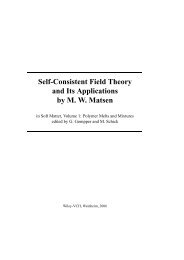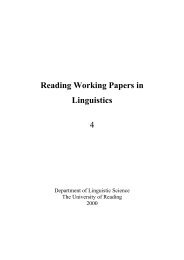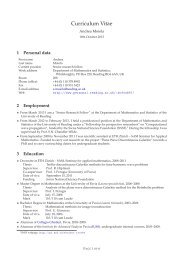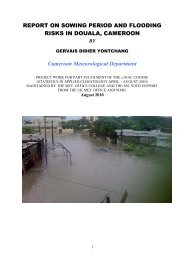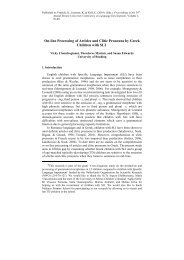Ritual, Myth and Magic in Early Modern Europe - University of Reading
Ritual, Myth and Magic in Early Modern Europe - University of Reading
Ritual, Myth and Magic in Early Modern Europe - University of Reading
You also want an ePaper? Increase the reach of your titles
YUMPU automatically turns print PDFs into web optimized ePapers that Google loves.
12<br />
focus <strong>and</strong> those that were primarily a form <strong>of</strong> secular enterta<strong>in</strong>ment, but as you will<br />
see <strong>in</strong> the course <strong>of</strong> your read<strong>in</strong>g, these dist<strong>in</strong>ctions are not always immediately<br />
visible. We will exam<strong>in</strong>e the extent <strong>of</strong> participation <strong>in</strong> such activities, their orig<strong>in</strong>s,<br />
development <strong>and</strong> critics, which might help our discussions next week <strong>of</strong> the impact<br />
that the Reformation had upon popular religion <strong>and</strong> popular culture.<br />
Sem<strong>in</strong>ar Preparation<br />
Our discussion <strong>of</strong> the ‗ritual year‘ will build upon a more detailed underst<strong>and</strong><strong>in</strong>g <strong>and</strong><br />
knowledge <strong>of</strong> the key dates <strong>and</strong> festivals <strong>in</strong> the calendar. We will spend the first part<br />
<strong>of</strong> the sem<strong>in</strong>ar draw<strong>in</strong>g up our own calendar <strong>of</strong> the ritual year, <strong>and</strong> look<strong>in</strong>g at the local<br />
or national festivals that took place. Most <strong>of</strong> the customs <strong>and</strong> rituals were celebrated<br />
with<strong>in</strong> a clear time-frame, mak<strong>in</strong>g it possible to break up the year <strong>in</strong>to more<br />
manageable chunks :<br />
(1) December – February<br />
(2) March – July<br />
(3) August - November<br />
As preparation for the class, identify <strong>and</strong> describe the major festivals <strong>and</strong> customs <strong>in</strong><br />
the months <strong>of</strong> the year allotted above.<br />
Some questions to consider :<br />
What went on at these events?<br />
How long did they last?<br />
What was their purpose – <strong>and</strong> did they have another function besides this?<br />
Were the celebrations primarily sacred or secular <strong>in</strong> their focus, this worldly or<br />
otherworldly?<br />
Were the celebrations adapted or altered, or condemned outright by church <strong>and</strong> /<br />
or state? Why?<br />
Discussion Questions<br />
What is a ‗ritual‘? : common problems <strong>of</strong> def<strong>in</strong>ition <strong>and</strong> application<br />
What function did ritual <strong>and</strong> communal celebration have for the <strong>in</strong>dividual <strong>and</strong><br />
community?<br />
How did rituals <strong>and</strong> attitudes to rituals change <strong>in</strong> this period?<br />
Was there a ‗reformation <strong>of</strong> ritual‘, or a ‗reformation <strong>of</strong> manners‘ <strong>in</strong> this period?<br />
Were there dist<strong>in</strong>ctively Protestant rituals?<br />
What k<strong>in</strong>ds <strong>of</strong> sources are available to the historian <strong>of</strong> popular culture <strong>and</strong> popular<br />
ritual? How valuable are they – is the history <strong>of</strong> popular culture possible?<br />
How easy is it separate religious rituals from secular ritual <strong>and</strong> folklore?<br />
Is it possible to dist<strong>in</strong>guish between magic <strong>and</strong> religion?


